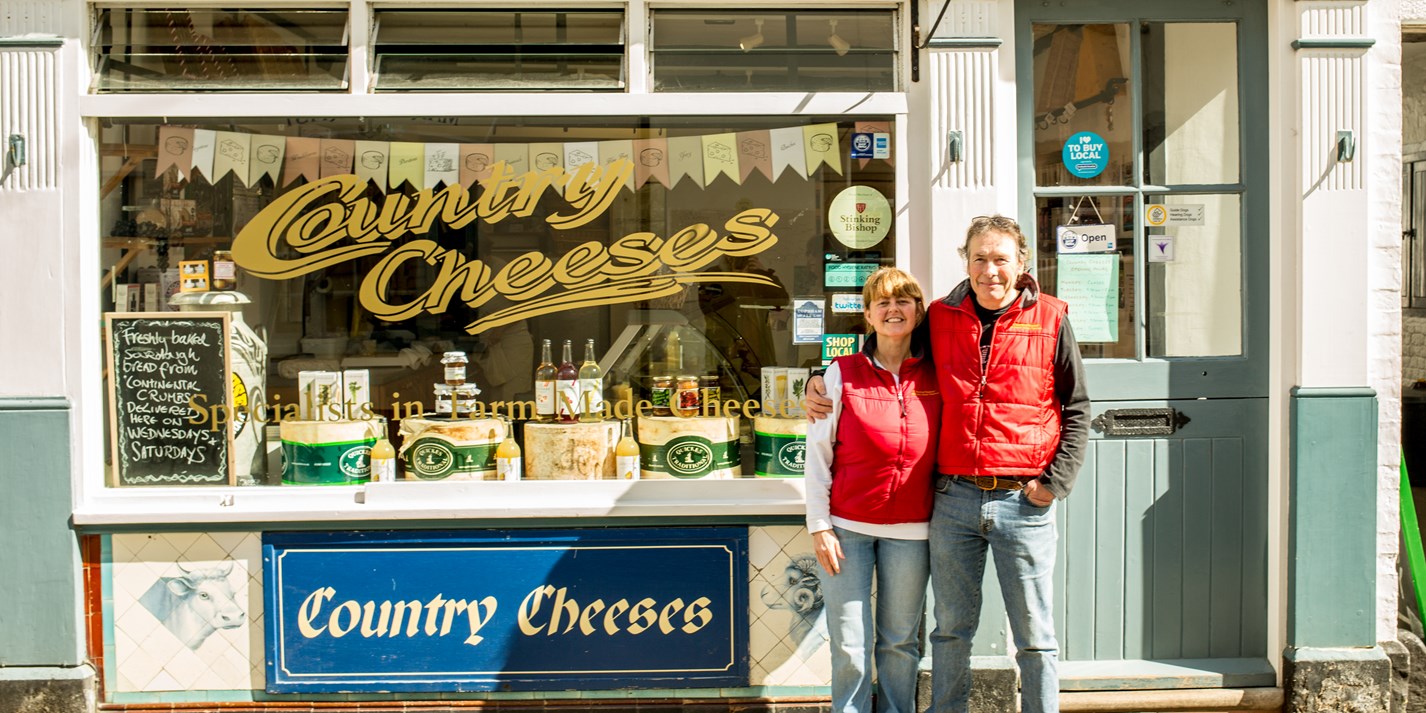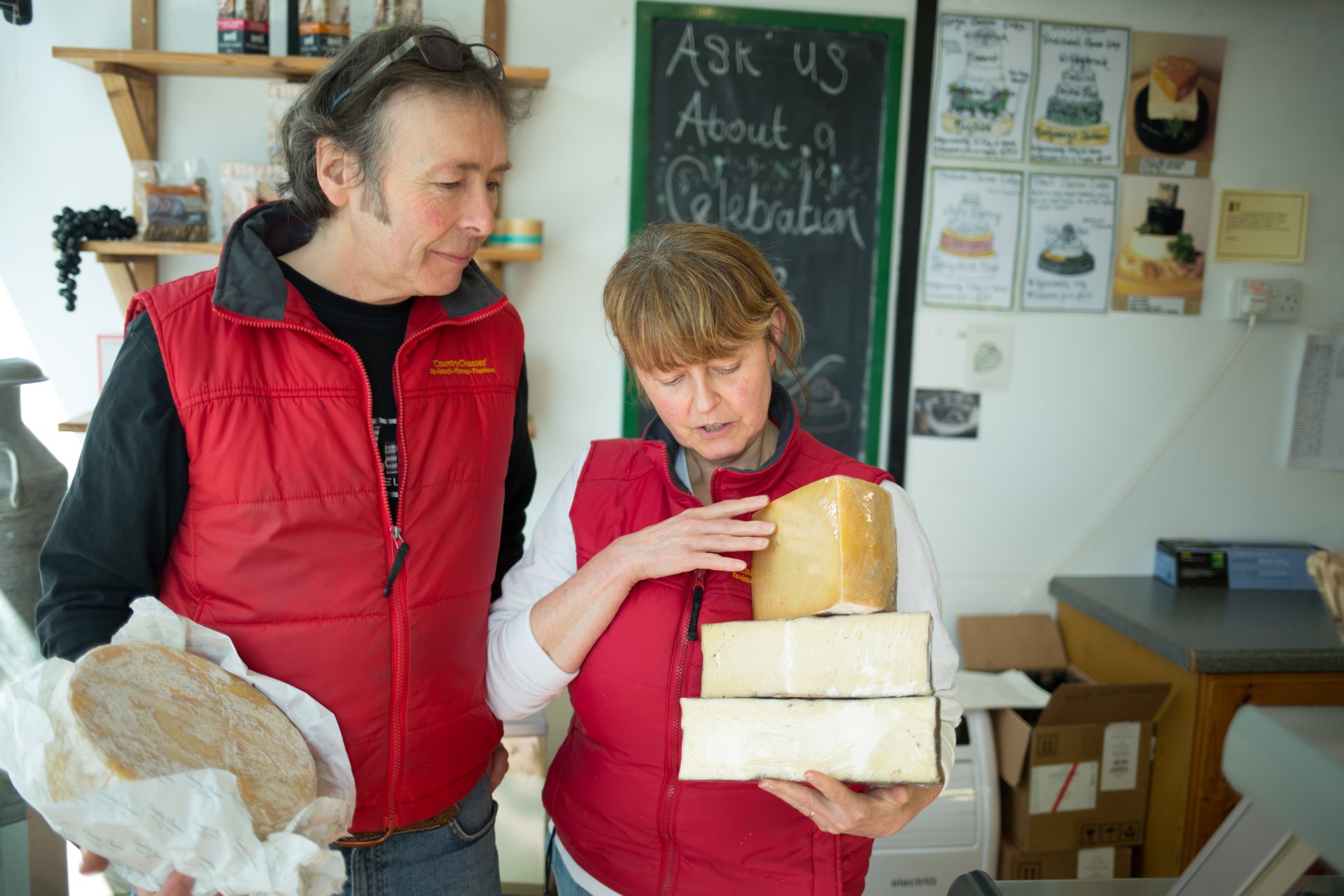By only stocking cheeses they can source direct from farms and producers in the South West, Country Cheeses has grown from a market stall to three shops across Devon. Tom Shingler of Great British Chefs finds out more.
The dream of opening an artisan cheese shop is probably pretty high up on the list for the majority of Britain’s foodies. Carefully selecting which varieties to sell, ensuring they mature and develop their flavours properly and talking at length about the complexity of flavours certain cheeses possess certainly sounds like my cup of tea. But wind the clock back twenty-eight years, and you’d be hard put to find many would-be cheesemongers. The food scene was pretty different, and there just wasn’t as much interest in eating local, seasonal, artisanal produce.
It’s thanks to people like Elise and Gary Jungheim, however, that helped spark an interest in British food. With a small stall at Tavistock’s Pannier Market, they started off selling around four or five cheeses from Curworthy, a small Devon creamery. Today, they operate three branches of Country Cheeses across the county, and were named Best Cheesemonger in last year’s Great British Cheese Awards.
‘Back then, all these lovely local cheeses were just getting sent off to London, and it was very hard to find anywhere to buy them in Devon,’ says Elise. ‘We had our little market stall for about three or four years before we realised we wanted something more. Country Cheeses came from a place of ignorance, really – we just really liked eating cheese. I suppose it’s as good a place to start as any!’
The first shop opened in Tavistock in 1994 – a time when ‘real’ food was becoming a thing. ‘We received so much support from both the cheesemakers and the public. Above all, we wanted to champion the producers in Somerset and Devon, so we spent a lot of time visiting the farms and cheesemakers to set up direct relationships. It’s just lovely to have that link – everyone’s got their own personality and character, and they’ve become friends.’
What set Country Cheeses apart from the outset was Gary and Elise’s commitment to British cheese. They’ve never stocked continental varieties, and never will – something that was almost unheard of back in the 1990s. ‘People expected to come into a cheese shop and see all their favourite foreign cheeses,’ explains Elise. ‘We certainly didn’t think continental cheeses were bad, but we wanted to play to our strengths; by developing these close relationships with the producers we could pass on the story and information to customers and shorten the link between cheesemaker and cheese-lover. Having a range of continental cheeses would’ve meant going through a wholesaler, which we didn’t want to do.’
A second shop in Topsham followed in 2001, and the third came about when Ticklemore – a well-known Devonian cheesemaker – asked Elise and Gary to take over their shop in Totnes. ‘We’d been buying cheese from them for years so to get asked if we’d like to take over the shop was a dream come true.’
Fast forward to today, and Country Cheeses has never been busier. With new cheesemakers popping up every month and our insatiable appetite for anything from washed-rinds to semi-softs, the UK has discovered there’s no need to import cheeses from Europe – there’s often someone making something very special in the local area. Now, Gary and Elise hold a cheesemaker’s fair every two years at their Tavistock shop, and even have their own cave where Gary acts as an affineur and ensures the cheeses are aged and matured in the proper way. He even dabbles in making his own.
‘Once someone makes a cheese and gives it to you to store and sell, it’s actually quite easy to end up spoiling it,’ he explains. ‘It’s a lot harder to take a cheese and make it better. I like to think of our cave as a sort of finishing school for young cheeses, where we can add our own sort of terroir. It just adds another unique flavour to it – the flora and moulds in the air around the edge of Dartmoor is going to be different to what you’d find in Sussex, for example, which has an effect on the final taste of the cheese.
‘If you do it right, you can end up with a cheese that’s able to express everything that’s been put into it during its life,’ continues Gary. ‘They all have their own characteristics – some require a little more nurturing than others, but at the end of the day they all need attention. You want to sit them on a nice wooden shelf rather than sterile stainless steel, things like that. I love spending time in the cave – it’s a place of peace and tranquillity. I’ll often go there to just relax and talk to the cheeses, or play them a bit of Pink Floyd!’
Article courtesy of Great British Chefs

